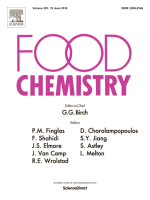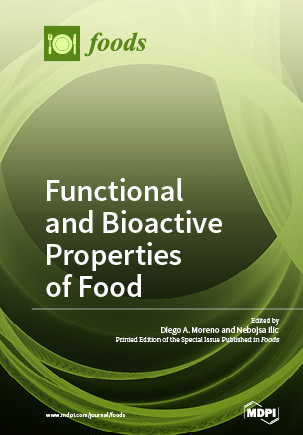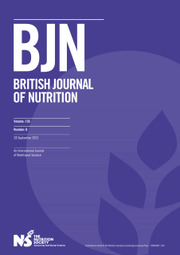Soybean »
Black Soybean
How to submit an article:
- Registered users can submit any published journal article that has a unique DOI (Digital Object Identifier) name or link to Research Hub.
- For example, you can paste the full DOI link:
https://doi.org/10.1109/5.771073or just the DOI name:10.1109/5.771073into the field above and click submit. - The person who is first to submit a valid article to Research Hub will forever be credited for it, and every article submission earns you +6 Research Points.
Published research studies are articles that present the findings of original research that has undergone a peer-review process and has been made publicly available in scholarly journals, books or other media.

Anti-α-glucosidase activity of Chinese traditionally fermented soybean (douchi)
2023 Jan Food Chemistry Chen J, Cheng YQ, Yamaki K, Li LT
The results indicated that A. oryzae could utilize cooked black soybean to generate certain α-glucosidase inhibitor more effectively than A. elegans and R. arrhizus.
Network Pharmacology Type 2 Diabetes Dan Dou Chi
Black soybean (Glycine max(L.) Merr.): paving the way toward new nutraceutical
2022 Feb 10 Critical Reviews in Food Science and Nutrition Kumar M, Suhag R, Hasan M, Dhumal S, Radha , Pandiselvam R, et al.
Review Article Black SoybeanModern extraction techniques improve the extraction of bioactive compounds from black soybeans, which have potential use in functional foods and nutraceutical components.

Black Soybean and Adzuki Bean Extracts Lower Blood Pressure by Modulating the Renin-Angiotensin System in Spontaneously Hypertensive Rats
2021 Jul 06 Foods Jeong EW, Park SY, Yang YS, Baek YJ, Yun DM, Kim HJ, et al.
Animal Study Black Soybean Renin-Angiotensin System Adzuki BeanAdzuki bean extracts have shown more potential than black soybean extracts in lowering blood pressure in hypertensive rats, acting on the renin-angiotensin system.

Black soyabean seed coat extract regulates iron metabolism by inhibiting the expression of hepcidin
2014 Jan 06 British Journal of Nutrition Mu M, Wu A, An P, Du X, Wu Q, Shen X, et al.
Experimental Study Anaemia Iron Deficiency Black Soybean HepcidinBlack soyabean seed coat extract significantly decreases hepcidin expression, leading to improved iron metabolism and potential treatment for iron-deficiency anaemia.

Comparative study on antiproliferation properties and cellular antioxidant activities of commonly consumed food legumes against nine human cancer cell lines
2012 Oct Food Chemistry Xu B, Chang SKC
Experimental Study Breast Cancer Black Soybean Cancer Adzuki Bean Antiproliferation Ovarian Cancer Stomach Cancer AnticancerAdzuki bean exhibited the strongest antiproliferative properties in a dose-dependent manner against all digestive system cancer cell lines, ovary cancer cell SK-OV-3 and breast cancer cell MCF-7 among all legumes tested.
Research insights are moderated by the Research Hub team and offer an at-a-glance overview of interesting research findings.

2022 Critical Reviews in Food Science and Nutrition
Modern extraction techniques improve the extraction of bioactive compounds from black soybeans, which have potential use in functional foods and nutraceutical components.
Review Article
Black soybean (Glycine max(L.) Merr.): paving the way toward new nutraceutical
Kumar M, Suhag R, Hasan M, Dhumal S, Radha , Pandiselvam R, et al.

2021 Foods
Adzuki bean extracts have shown more potential than black soybean extracts in lowering blood pressure in hypertensive rats, acting on the renin-angiotensin system.
Animal Study Adzuki Bean Renin-Angiotensin System
Black Soybean and Adzuki Bean Extracts Lower Blood Pressure by Modulating the Renin-Angiotensin System in Spontaneously Hypertensive Rats
Jeong EW, Park SY, Yang YS, Baek YJ, Yun DM, Kim HJ, et al.

2014 British Journal of Nutrition
Black soyabean seed coat extract significantly decreases hepcidin expression, leading to improved iron metabolism and potential treatment for iron-deficiency anaemia.
Experimental Study Anaemia Hepcidin Iron Deficiency
Black soyabean seed coat extract regulates iron metabolism by inhibiting the expression of hepcidin
Mu M, Wu A, An P, Du X, Wu Q, Shen X, et al.

2012 Food Chemistry
Adzuki bean exhibited the strongest antiproliferative properties in a dose-dependent manner against all digestive system cancer cell lines, ovary cancer cell SK-OV-3 and breast cancer cell MCF-7 among all legumes tested.
Experimental Study Adzuki Bean Anticancer Antiproliferation Breast Cancer Cancer
Comparative study on antiproliferation properties and cellular antioxidant activities of commonly consumed food legumes against nine human cancer cell lines
Xu B, Chang SKC
Review Articles
Review articles summarise and critically evaluate the current state of research on a specific topic or field by synthesising multiple primary research studies.
Clinical Trials
Clinical trials are research studies that involve people and are conducted to evaluate the safety and efficacy of new treatments or interventions, such as drugs, medical devices, or behavioural therapies.
Study Protocols
Published study protocols are detailed plans that outline the objectives, methodology, statistical analyses, and organisation of a research study that have been made publicly available for others to review and use as a reference.
Presentation Slides

Review Article
Modern extraction techniques improve the extraction of bioactive compounds from black soybeans, which have potential use in functional foods and nutraceutical components.
Kumar M, Suhag R, Hasan M, Dhumal S, Radha , Pandiselvam R, Senapathy M, Sampathrajan V, Punia S, Sayed AAS, Singh S, Kennedy JF

Animal Study
Adzuki bean extracts have shown more potential than black soybean extracts in lowering blood pressure in hypertensive rats, acting on the renin-angiotensin system.
Jeong EW, Park SY, Yang YS, Baek YJ, Yun DM, Kim HJ, Go GW, Lee HG

Experimental Study
Black soyabean seed coat extract significantly decreases hepcidin expression, leading to improved iron metabolism and potential treatment for iron-deficiency anaemia.
Mu M, Wu A, An P, Du X, Wu Q, Shen X, Wang F

Experimental Study
Adzuki bean exhibited the strongest antiproliferative properties in a dose-dependent manner against all digestive system cancer cell lines, ovary cancer cell SK-OV-3 and breast cancer cell MCF-7 among all legumes tested.
Xu B, Chang SKC
Executive Summary
Write an executive summary in the form of a blog article on the topic of "Research into Chinese medicine treatment for Black Soybean" summarising the research below and using language that can be easily understood by patients and avoiding medical jargon using a professional and caring tone of voice.
Write an executive summary in the form of a blog article on the topic of "Researched Chinese medicine treatments for Black Soybean" summarising the research below in an objective and easy to understand way, and using language that can be easily understood by patients. Group the article into Chinese medicine treatments first, followed by nutrition and other treatments. Avoid using medical jargon and use a professional and caring tone of voice.
Write me a concise but easy to understand executive summary on the topic of "Chinese medicine treatments for Black Soybean" based on the following research that I will give you. Your summary should be 2 paragraphs long in Australian English spelling and include references to the studies.
A Review Article published in 2022 in the journal Critical Reviews in Food Science and Nutrition found that Modern extraction techniques improve the extraction of bioactive compounds from black soybeans, which have potential use in functional foods and nutraceutical components. These modern extraction techniques involve the application of technologies such as microwaves, ultrasounds, and enzymes. Contrary to traditional methods that depend on simple yet toxic solvents, these contemporary options yield higher amounts of bioactive substances from black soybeans, are quicker, and are less damaging to the environment. The exact bioactive compounds extracted include anthocyanins, phenolic acids, isoflavones, and flavones, among others. Researchers discovered that black soybeans, and specifically their seed coat, are rich in various bioactive compounds. These compounds have been reported to possess numerous health benefits, showing antioxidant, anti-cancer, anti-diabetic, anti-obesity, anti-inflammatory, cardio and neuroprotective activities. The study also explores how these soybean extracts have been used in the manufacture of food products like noodles, in the development of biodegradable films with pH sensitivity, and in therapeutic applications such as promoting wound healing and alleviating inflammation. The comprehensive review, therefore, serves as a handy reference for food manufacturers and scientists, showcasing the vast potential of black soybeans in the development of functional foods and nutraceuticals.
A Animal Study published in 2021 in the journal Foods found that Adzuki bean extracts have shown more potential than black soybean extracts in lowering blood pressure in hypertensive rats, acting on the renin-angiotensin system. The methodology used in this research involved the administration of varying volumes of black soybean and adzuki bean ethanol extracts to seven groups of rats, which included one group of normal rats and six groups of spontaneously hypertensive rats. The purpose of the extracts was to explore their antihypertensive effects on aspects such as blood pressure, the renin-angiotensin system, and aortic lesions. The results revealed that black soybean and adzuki bean extracts significantly reduced various biomarkers such as liver weight, triglycerides, total cholesterol, and systolic blood pressure. On a comparative basis, the adzuki bean extracts (AE) demonstrated a greater antihypertensive potential than black soybean extracts (BE). Specifically, the angiotensin II level and blood pressure in the AE-treated group were lower than those in the BE-treated group, leading to the conclusion that AE exhibits higher antihypertensive potential.
A Experimental Study published in 2014 in the journal British Journal of Nutrition found that Black soyabean seed coat extract significantly decreases hepcidin expression, leading to improved iron metabolism and potential treatment for iron-deficiency anaemia. The research employed both in vitro and in vivo experimental designs using cells treated with black soyabean seed coat extract (BSSCE) and 8-week-old male mice fed with a diet containing 2% BSSCE respectively. The study measured the effect of this extract on the expression of hepcidin, which is known to regulate iron homeostasis. In addition to this, its impact on splenic iron concentrations, serum iron concentrations and the phosphorylation levels of specific proteins was assessed. The study found that BSSCE effectively inhibited the expression of hepcidin in both the in vitro and in vivo investigations. The mice given a diet containing BSSCE showed a decrease in hepatic hepcidin expression and splenic iron concentrations, while at the same time, an increase was observed in serum iron concentrations. The BSSCE induced this change through a decrease in the phosphorylation of mothers against decapentaplegic homolog proteins. There were marked increases in erythrocyte counts, hemoglobin concentrations, and hematocrit values in the test mice, indicating improved iron metabolism. This suggest that black soyabean extract has potential in regulating iron metabolism, presenting possibilities for the treatment of hepcidin-related diseases, including iron-deficiency anaemia.
A Experimental Study published in 2012 in the journal Food Chemistry found that Adzuki bean exhibited the strongest antiproliferative properties in a dose-dependent manner against all digestive system cancer cell lines, ovary cancer cell SK-OV-3 and breast cancer cell MCF-7 among all legumes tested. This research involved comparing the health-promoting effects of various food legumes. The Cellular Antioxidant Activity (CAA) was assessed using a fluorescence microplate reader and in vitro animal cell cultivation. The antiproliferative properties against cancer cells were evaluated through the MTT method in an in vitro cell culture system. Additionally, the study quantified phytochemicals (total phenolic, procyanidin, saponin, and phytic acid) and chemical antioxidant activities (DPPH free radical scavenging activity, oxygen radical absorbing capacity, peroxyl radical scavenging capacity). The results indicated significant variations in phytochemical and antioxidant activities among different legumes. Notably, adzuki bean demonstrated the strongest dose-dependent antiproliferative effects against various cancer cell lines, including those from the digestive system, ovary, and breast. Meanwhile, black soybean showed the highest levels of saponin, phytic acid, and the strongest cellular antioxidant activities. These findings suggest that food legumes, particularly adzuki beans and black soybeans, are promising as natural antioxidants for health promotion and cancer prevention.
Moderation Tools
Topic
Sign In
Users not signed in are limited to viewing the 5 most recent items of content.